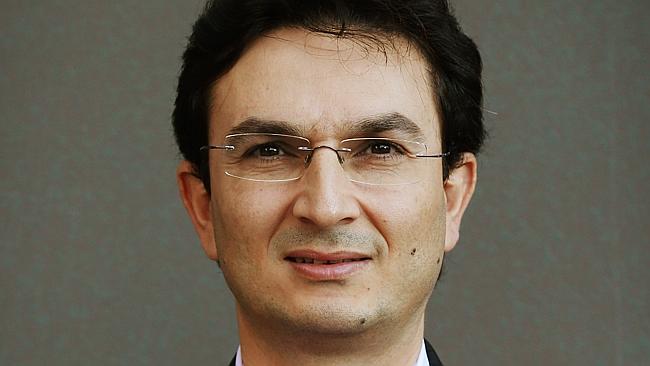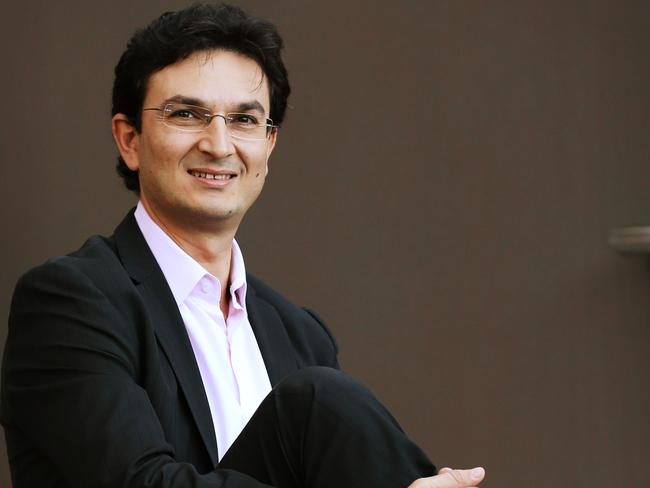A/Prof Munjed Al Muderis: The refugee turned top surgeon who’s caught Prince Harry’s attention
HE was inspired by Arnie, defied orders from Saddam Hussein, and now he’ll be given an audience with Prince Harry to tell his extraordinary story.

HE was inspired by the Terminator, defied orders from Saddam Hussein, and now he’ll be given an audience with Prince Harry.
But it’s not all about big names for Asssociate Professor Munjed Al Muderis, the penniless refugee turned high profile surgeon, who will be showing off his groundbreaking “osseointegration technology” and surgery to the visiting royal at his Sydney clinic this afternoon.
A/Prof Al Muderis is hoping a royal visit to his Macquarie University Clinic will help boost the profile of the robotic limbs he has developed to treat injured soldiers and civilians in war-torn countries.
Speaking with news.com.au from Sydney’s Lindt Cafe taking some time out before his day gets crazy, A/Prof Muderis tells how his upbringing in war-torn Iraq inspired him to get to where he is.

“I was born and raised in a war-torn country, I’ve seen a lot where I come from, I’ve seen a lot of people losing their limbs,” he says.
“That kind of gave me the inspiration and the compassion in improving patients’ lives and getting back to normality.
“But that came after I saw The Terminator as a 12-year-old.”
Since he saw the Schwarzenegger film in 1984, the young Iraqi boy became obsessed with half-robot, half-machine figures, and decided it would somehow be part of his future.
“I guess I was just fixated on it and then I linked that to what I’d seen during three wars. As a medical student in Iraq I was very hands on in treating injured people and I kind of knew that was part of the answer.”
After completing his studies, A/Prof Al Muderis started work at a state hospital under the brutal regime of Saddam Hussein. While there he was ordered to amputate the ears of Iraqi soldiers. When he saw his supervisor murdered in cold blood after refusing to disfigure the men, he made the decision to flee.
Travelling to Australia in 1999 on a rickety boat packed with asylum seekers only to be delivered to a detention centre, A/Prof Al Muderis never let go of his dream to put his obsession with robotic limbs to practical use.
He’s now become one of the world’s most highly respected orthopedic surgeons, and it’s his work in osseointegration, where an implant is inserted into an amputee’s residual limb and integrated into the bone allowing the user to easily walk with robotic legs, that’s grabbed the attention of Prince Harry.

“We’ve now operated on several veterans from the UK as well as from Australia, and His Royal Highness is very interested in this area,” he says.
“He looks after injured veterans and that’s playing a major role in supporting the whole process.”
The Prince has previously met one of A/Prof Al Muderis’ current patients British Lieutenant Ali Spearing, whose progress His Royal Highness will check up on later today.
Having lost both his legs above the knee in an IED explosion in Afghanistan in 2011, the 31-year-old soldier had his new robotic legs fitted just 10 days ago.
He’s just started walking again on crutches and says it’s just been “amazing”.
“I spent about three years in the military rehab system trying to walk on sockets and after trying for a long time I realised it just wasn’t going to happen,” he tells news.com.au.
He’s met Prince Harry before, and says he’s stoked the Prince has decided to “pop round and see how I’m going” today.


Lieutenant Spearing is keen to head back to the UK in a couple of weeks where he hopes the technology will soon be made more widely available for soldiers like him and others who could be helped through the technology and treatment A/Prof Al Muderis has pioneered.
The surgeon will be travelling to the UK to treat more British soldiers next month, has more procedures scheduled in Poland later in the year, and then will travel to Cambodia in October to treat landmine victims.
“My aim is that this procedure becomes well known, that this technology becomes more available to the common day to day person,” he says.
And while his biggest fans is certainly not what most would call a “common person”, the popular royal is certainly helping to push that cause.




